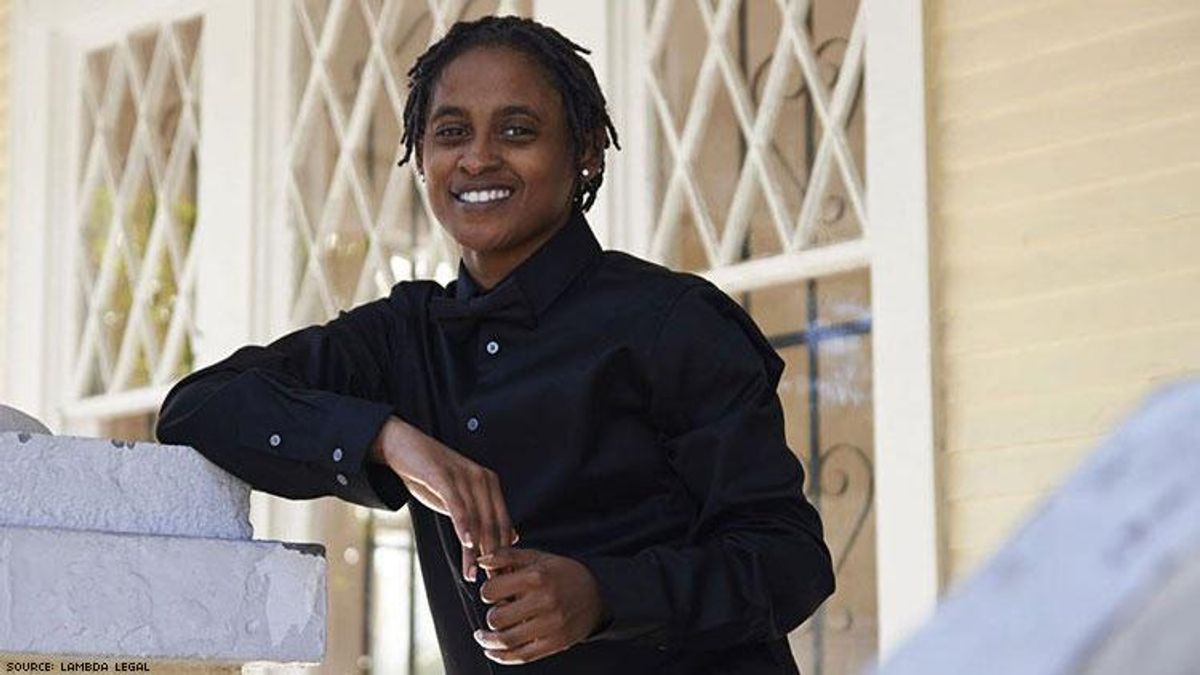The Supreme Court announced today that it will not hear a lesbian's employment discrimination case, which would have provided a test of whether federal law against sex discrimination applies to sexual orientation as well.
The court turned down the case of Jameka Evans, who says she suffered harassment and discrimination at her job as a security guard at Georgia Regional Hospital in Savannah and was eventually forced out because she's a lesbian and gender-nonconforming, The Hill reports. The justices offered no comment, as is usually the case.
In March a three-judge panel of the U.S, Court of Appeals for the Eleventh Circuit, in a 2-1 ruling, upheld a lower court's dismissal of Evans's suit against the hospital. The judges did not dispute the facts of the case, but the majority said they were bound by precedent that Title VII of the Civil Rights Act of 1964, which prohibits sex discrimination, does not cover discrimination based on sexual orientation. Lambda Legal, representing Evans, asked the full court to rehear the case, but this summer it declined to do so, leaving Lambda no option but to go to the Supreme Court. Now it has declined as well.
"By declining to hear this case, the Supreme Court is delaying the inevitable and leaving a split in the circuits that will cause confusion across the country," said Greg Nevins, employment fairness project director for Lambda Legal, in a press release. The high court often steps in to resolve such splits, that is, conflicting rulings from various federal court circuits.
He emphasized, however, that "this was not a 'no' but a 'not yet.'" He added, "Lambda Legal will continue the fight, circuit by circuit as necessary, to establish that the Civil Rights Act prohibits sexual orientation discrimination. The vast majority of Americans believe that LGBT people should be treated equally in the workplace. The public is on the right side of history; it's unfortunate that the Supreme Court has refused to join us today, but we will continue to invite them to do the right thing and end this hurtful balkanization of the right of LGBT people to be out at work."
There have been mixed rulings from federal appeals courts on whether Title VII applies to sexual orientation discrimination. In April the U.S. Court of Appeals for the Seventh Circuit became the first federal appellate court to rule that it does. Its ruling came in the case of Kimberly Hively, who was fired as an instructor at a community college in Indiana after it became known she was a lesbian. The Seventh Circuit sent the case back to the trial court for rehearing based on the facts, but with the understanding that Title VII applies.
Also, in light of the ruling in Hively's case, the full U.S. Court of Appeals for the Second Circuit decided to rehear a case that a three-judge panel of the court rejected based on a narrower interpretation of Title VII, Zarda v. Altitude Express, a skydiving company on Long Island. Donald Zarda had claimed the company fired him for telling a customer he was gay. He died in a skydiving accident after filing the lawsuit, but his estate is continuing to pursue it. In September the Justice Department filed a friend-of-the-court brief arguing that Title VII should not be interpreted to cover sexual orientation.
During Donald Trump's presidency, the Justice Department has also held that Title VII does not cover discrimination based on gender identity. This is the opposite of the stance the department took under Barack Obama, when it held that Title VII prohibited discrimination based on both sexual orientation and gender identity. The Equal Employment Opportunity Commission, a largely autonomous federal agency, has backed the latter interpretation. Also, some federal courts have ruled that the law covers gender identity.
People who believe they've suffered workplace discrimination due to sexual orientation or gender identity should still pursue legal action, Nevins said, and he urged them to contact Lambda Legal. He also called on Congress to pass a law explicitly banning discrimination based on both characteristics.
This month the Supreme Court declined to hear another LGBT rights case, saying it won't review a Texas Supreme Court ruling that marriage equality doesn't necessarily mean employers have to provide equal benefits to all spouses, same-sex or opposite-sex. The Texas high court had sent that case back to the Harris County District Court in Houston for consideration, and that is where it stands now.












































































